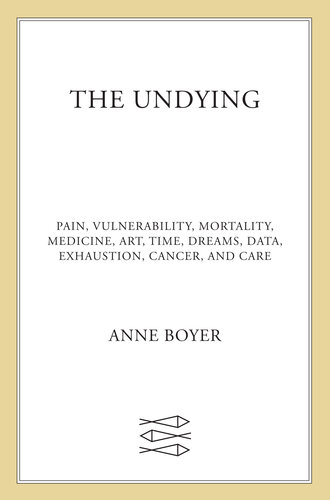
The Undying
Pain, vulnerability, mortality, medicine, art, time, dreams, data, exhaustion, cancer, and care
درد، آسیبپذیری، مرگ و میر، دارو، هنر، زمان، رویاها، دادهها، خستگی، سرطان و مراقبت
کتاب های مرتبط
- اطلاعات
- نقد و بررسی
- دیدگاه کاربران
نقد و بررسی

Starred review from June 10, 2019
Poet Boyer (Garments Against Women) returns with a beautiful memoir about her battle with breast cancer. The book covers Boyer’s 2014 diagnosis at age 41, her grueling chemotherapy treatments, and her double mastectomy, delving into the fear, suffering, and loneliness that cancer brings. Cancer makes “the boundaries of our bodies break,” Boyer writes. “Everything we were supposed to keep inside of us now seems to fall out.... We can’t stop crying. We emit foul odors. We throw up.” Boyer criticizes the “capitalist medical universe” in which women are given “drive-through mastectomies,” and she puts into sharp focus the economic toll cancer takes on women of limited means. A single mother with no savings, Boyer had to return to her teaching job 10 days after her surgery because her medical leave had run out; she was so weak that friends had to carry her books. This memoir lays bare Boyer’s pain and exhaustion and is stacked with revelatory observations: “There is no more tragic piece of furniture than a bed,” she writes, “how it falls so quickly from the place we make love to the place we might die in.” Boyer’s gorgeous language elevates this artful, piercing narrative well above the average medical memoir.

July 1, 2019
A passionate and eloquent memoir about one woman's battle with breast cancer. Award-winning poet and essayist Boyer (Creative Writing/Kansas City Art Institute; A Handbook of Disappointed Fate, 2018, etc.), a single mother living on a tight budget, was diagnosed with highly aggressive breast cancer when she was 41. Her doctor (who she later replaced) said her tumor was "necrotic, which meant that it was growing so quickly it failed to build infrastructure for itself." He recommended chemotherapy right away. Her treatment with Neulasta cost $7,000 per shot. As the author writes, "someone once said that choosing chemotherapy is like choosing to jump off a building when someone is holding a gun to your head." Boyer looked for guidance and inspiration from other women artists who suffered from the disease, including Susan Sontag, Alice James, Rachel Carson, Audre Lorde, Fanny Burney, Kathy Acker, and Eve Kosofsky Sedgwick. Boyer kept a journal, a "minor form of reparative magic," which she abandoned hundreds of times. John Donne's "sickbed masterpiece," Devotions Upon Emergent Occasions, written when he thought he was dying, casts an influential shadow over her book. Both have complex structures and are highly meditative, but Boyer's "exercise in lamentation" is secular where Donne's was religious. She takes us on a deeply personal journey into "my body in pain," "eviscerating sadness," and profound loss--eyelashes, eyebrows, toenails, nerves, brain cells, her hair. "I like wigs," she writes. "I wear wigs. People I like wear wigs. Dolly Parton wears wigs....Medusa wore a wig made of snakes." Eventually, Boyer had a double mastectomy. "In the capitalist medical universe in which all bodies must orbit around profit at all times," she writes, "even a double mastectomy is considered an outpatient procedure." She learned that everyone lies, from pharmaceutical companies to doctors and researchers and the internet. "Now that I am undying," she writes, "the world is full of possibility." Told with brutal clarity, this is a haunting testimony about death that is filled with life.
COPYRIGHT(2019) Kirkus Reviews, ALL RIGHTS RESERVED.

August 1, 2019
With this work, poet and essayist Boyer (A Handbook of Disappointed Fate) explores cancer treatment within both historical and modern contexts and details her own very personal journey through breast cancer. Boyer notes that with the ubiquity of breast cancer awareness, the pink ribbons and supportive slogans often become divorced from the very raw suffering of those battling the disease. She takes readers through the most stressful parts of her treatment, interspersing her musings on the nature of pain and how sickness, both past and present, has changed and been perceived by society. At times it's a difficult read owing to the descriptions of extremely invasive treatments and more abstract discussions of suffering that can be difficult to follow given the complexity of the prose. VERDICT Overall, a lyrical account that alternates between a philosophical treatise and personal memoir of the physical and emotional cost of breast cancer. [See Prepub Alert, 3/17/19.]--]Stacy Shaw, Denver
Copyright 2019 Library Journal, LLC Used with permission.

Starred review from August 1, 2019
At age 41, poet and essayist Boyer was diagnosed with a highly aggressive form of breast cancer, sending her into the abyss of treatment and recovery which accompanies this physically and emotionally devastating disease. Her writerly perspective is unique, and she brings to this elegant and eviscerating memoir a poet's sharp anguish that cuts like a righteous blade through the familiar bland heroics of the breast cancer industry. Boyer writes, I do not want to tell the story of cancer in the way that I have been taught to tell it. Indeed, readers will find something far different here from t-shirt slogans and pink-ribbon campaigns. Calling upon the works of Audre Lorde, Kathy Acker, and Susan Sontag, Boyer insists on a reconsideration of how we treat the diagnosed and discuss the diagnosis. She rails against false hope and challenges the theatrics of feel-good fundraising, while casting a baleful eye at those who tout awareness as opposed to tackling the dirty work of trying to determine what causes the disease. Call it a battle cry, call it a fury-fueled elegy, call it the work of a woman who will not be denied. In every way, The Undying should not be missed.(Reprinted with permission of Booklist, copyright 2019, American Library Association.)

























دیدگاه کاربران